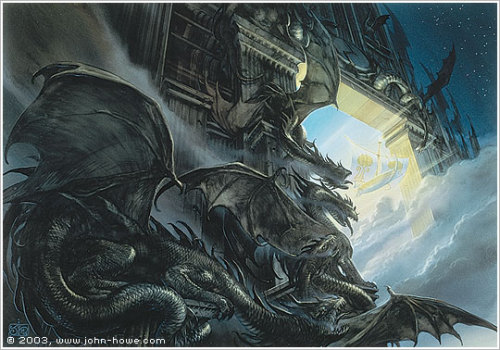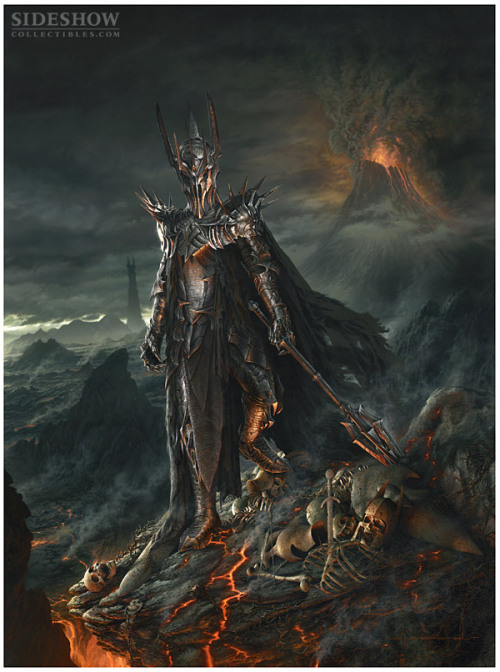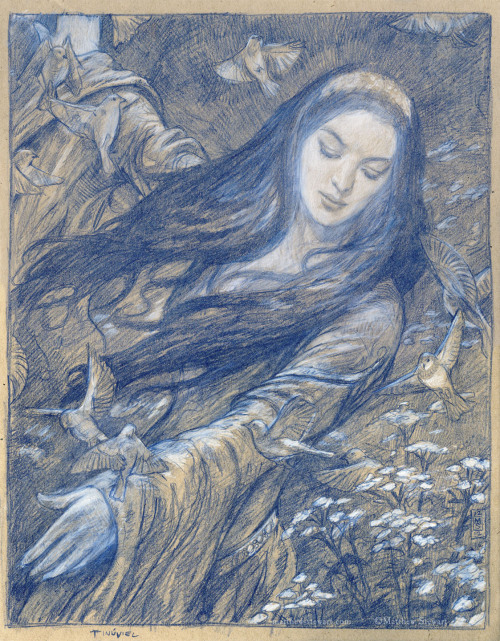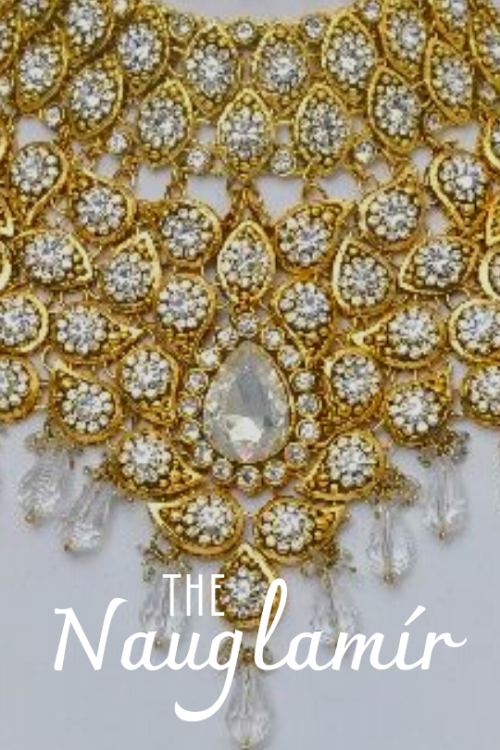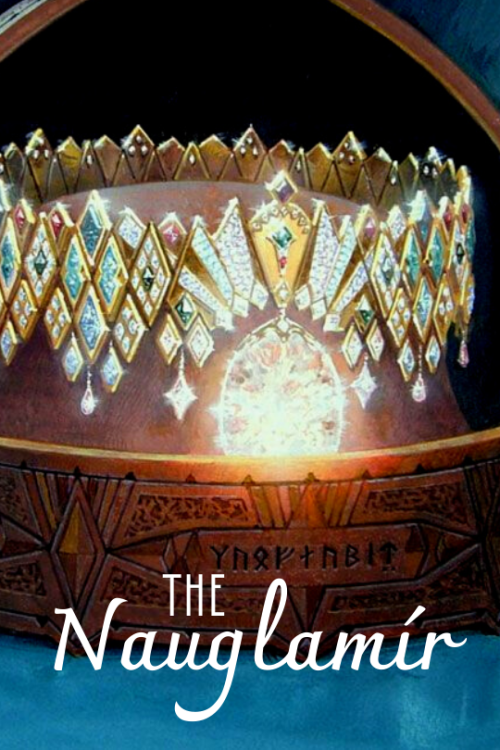#the history of middle earth
“Thus spake Mandos in prophecy, when the Gods sat in judgement in Valinor, and the rumour of his words was whispered among all the Elves of the West. When the world is old and the Powers grow weary, then Morgoth, seeing that the guard sleepeth, shall come back through the Door of Night out of the Timeless Void; and he shall destroy the Sun and Moon. But Eärendel shall descend upon him as a white and searing flame and drive him from the airs. Then shall the Last Battle be gathered on the fields of Valinor. In that day Tulkas shall strive with Morgoth, and on his right hand shall be Fionwë, and on his left Túrin Turambar, son of Húrin, coming from the halls of Mandos; and the black sword of Túrin shall deal unto Morgoth his death and final end; and so shall the children of Húrin and all Men be avenged.
Thereafter shall Earth be broken and re-made, and the Silmarils shall be recovered out of Air and Earth and Sea; for Eärendel shall descend and surrender that flame which he hath had in keeping. Then Fëanor shall take the Three Jewels and bear them to Yavanna Palúrien; and she will break them and with their fire rekindle the Two Trees, and a great light shall come forth. And the Mountains of Valinor shall be levelled, so that the Light shall go out over all the world. In that light the Gods will grow young again, and the Elves awake and all their dead arise, and the purpose of Ilúvatar be fulfilled concerning them. But of Men in that day the prophecy of Mandos doth not speak, and no Man it names, save Túrin only, and to him a place is given among the sons of the Valar.”
—J.R.R. Tolkien, The History of Middle-earth V: The Lost Road and Other Writings, “Quenta Silmarillion”
“The appearance of Túrin at the end remains profoundly mysterious…. it is said that Túrin is named among ‘the sons of the Gods’ rather than among the Gods, and also that he comes ‘from the halls of Mandos’ to the final battle; about which I can say no more than that Túrin Turambar, though a mortal Man, did not go, as do the race of Men, to a fate beyond the world.”
—Christopher Tolkien, The History of Middle-earth IV: The Shaping of Middle-earth, “The Quenta”
Post link
“So it came to pass that when the light of Valinor failed, for ever as the Noldor thought, she joined the rebellion against the Valar who commanded them to stay; and once she had set foot upon that road of exile, she would not relent, but rejected the last message of the Valar, and came under the Doom of Mandos. Even after the merciless assault upon the Teleri and the rape of their ships, though she fought fiercely against Fëanor in defence of her mother’s kin, she did not turn back. Her pride was unwilling to return, a defeated suppliant for pardon; but now she burned with desire to follow Fëanor with her anger to whatever lands he might come, and to thwart him in all ways that she could.
Pride still moved her when, at the end of the Elder Days after the final overthrow of Morgoth, she refused the pardon of the Valar for all who had fought against him, and remained in Middle-earth. It was not until two long ages more had passed, when at last all that she had desired in her youth came to her hand, the Ring of Power and the dominion of Middle-earth of which she had dreamed, that her wisdom was full grown and she rejected it, and passing the last test departed from Middle-earth for ever.”
—J.R.R. Tolkien, The History of Middle-earth XII: The Peoples of Middle-earth, Chapter XI “The Shibboleth of Fëanor”(Galadriel)
Post link
‘Ah, wise lady!’ said Finrod. 'I am an Elda, and again I was thinking of my own people. But nay, of all the Children of Eru. I was thinking that by the Second Children we might have been delivered from death. For ever as we spoke of death being a division of the united, I thought in my heart of a death that is not so: but the ending together of both. For that is what lies before us, so far as our reason could see: the completion of Arda and its end, and therefore also of us children of Arda; the end when all the long lives of the Elves shall be wholly in the past.
'And then suddenly I beheld as a vision Arda Remade; and there the Eldar completed but not ended could abide in the present for ever, and there walk, maybe, with the Children of Men, their deliverers, and sing to them such songs as, even in the Bliss beyond bliss, should make the green valleys ring and the everlasting mountain-tops to throb like harps.’
Then Andreth looked under her brows at Finrod: 'And what, when ye were not singing, would ye say to us?’ she asked.
Finrod laughed. 'I can only guess,’ he said. 'Why, wise lady, I think that we should tell you tales of the Past and of Arda that was Before, of the perils and great deeds and the making of the Silmarils! We were the lordly ones then! But ye, ye would then be at home, looking at all things intently, as your own. Ye would be the lordly ones. “The eyes of Elves are always thinking of something else,” ye would say. But ye would know then of what we were reminded: of the days when we first met, and our hands touched in the dark. Beyond the End of the World we shall not change; for in memory is our great talent, as shall be seen ever more clearly as the ages of this Arda pass: a heavy burden to be, I fear; but in the Days of which we now speak a great wealth.’ And then he paused, for he saw that Andreth was weeping silently.
'Alas, lord!’ she said. 'What then is to be done now? For we speak as if these things are, or as if they will assuredly be. But Men have been diminished and their power is taken away. We look for no Arda Remade: darkness lies before us, into which we stare in vain. If by our aid your everlasting mansions were to be prepared, they will not be builded now.’
'Have ye then no hope?’ said Finrod.
'What is hope?’ she said. 'An expectation of good, which though uncertain has some foundation in what is known? Then we have none.’
'That is one thing that Men call “hope”,’ said Finrod. ’Amdir we call it, “looking up”. But there is another which is founded deeper. Estel we call it, that is “trust”. It is not defeated by the ways of the world, for it does not come from experience, but from our nature and first being. If we are indeed the Eruhin, the Children of the One, then He will not suffer Himself to be deprived of His own, not by any Enemy, not even by ourselves. This is the last foundation of Estel, which we keep even when we contemplate the End: of all His designs the issue must be for His Children’s joy. Amdir you have not, you say. Does no Estel at all abide?’
–J.R.R. Tolkien, The History of Middle-earth X: Morgoth’s Ring, “Athrabeth Finrod Ah Andreth”
Melkor “incarnated himself” (as Morgoth) permanently. He did this so as to control the hroa, the “flesh” or physical matter, of Arda. He attempted to identify himself with it. A vaster, and more perilous, procedure, though of similar sort to the operation of Sauron with the Rings. Thus, outside the Blessed Realm, all “matter” was likely to have a “Melkor ingredient”, and those who had bodies, nourished by the hora of Arda, had as it were a tendency, small or great, towards Melkor: they were none of them wholly free of him in their incarnate form, and their bodies had an effect upon their spirits. But in this way Morgoth lost (or exchanged, or transmuted) the greater part of his original “angelic” powers, of mind and spirit, while gaining a terrible grip upon the physical world. For this reason he had to be fought, mainly by physical force, and enormous material ruin was a probable consequence of any direct combat with him, victorious or otherwise.
—-
This is the chief explanation of the constant reluctance of the Valar to come into open battle against Morgoth. Manwë’s task and problem was much more difficult than Gandalf’s. Sauron’s, relatively smaller, power was concentrated; Morgoth’s vast power was disseminated. The whole of “Middle-earth” was Morgoth’s Ring, though temporarily his attention was mainly upon the North-west. Unless swiftly successful, War against him might well end in reducing all Middle-earth to chaos, possibly even all Arda.
—-
It is easy to say: “It was the task and function of the Elder King to govern Arda and make it possible for the Children of Eru to live in it unmolested.” But the dilemma of the Valar was this: Arda could only be liberated by a physical battle; but a probable result of such a battle was the irretrievable ruin of Arda. Moreover, the final eradication of Sauron (as a power directing evil) was achievable by the destruction of the Ring. No such eradication of Morgoth was possible, since this required the complete disintegration of the “matter” of Arda.Morgoth’s Ring - The History of Middle-Earth - J.R.R. Tolkien
Post link
He sped towards the hillock green,
the lissom limbs, the dancing sheen;
he leapt upon the grassy hill
his arms with loveliness to fill:
his arms were empty, and she fled;
away, away her white feet sped.
But as she went he swiftly came
and called her with the tender name
of nightingales in elvish tongue,
that all the woods now sudden rung:
‘Tinúviel! Tinúviel!’
And clear his voice was as a bell;
'Tinúviel! Tinúviel!’
His voice such love and longing filled
one moment stood she, fear was stilled;
one moment only; like a flame
he leaped towards her as she stayed
and caught and kissed that elfin maid.As love there woke in sweet surprise
the starlight trembled in her eyes.
A! Lúthien! A! Lúthien!
more fair than any child of Men;
O! loveliest maid of Elfinesse,
what madness does thee now possess!
A! lissom limbs and shadowy hair
and chaplet of white snowdrops there;
O! starry diadem and white
pale hands beneath the pale moonlight!
She left his arms and slipped away
just at the breaking of the day.
–J.R.R. Tolkien, The History of Middle-earth III: The Lays of Beleriand, “The Lay of Leithian”, Canto III
Post link
Middle-earth March - Day 29
“The Lord of the Rings” is not a book or a work, it is the ruler of the rings and there is only one. Sauron, the Lord of the Rings. Probably that’s why the Amazon series is called “The Lord of the Rings” as it revolves around Sauron. Our little Sauron doesn’t hurt anyone, he just looks cute!
Post link
all the tolkien ladies ♥︎ andreth
Andreth was a wisewoman from the House of Bëor. She was called Saelind by the Elves, for she was wise in thought and learned in the lore of Men. Andreth was deeply in love with the Noldorin Elf-lord Aegnor. During the Siege of Angband Aegnor saw young Andreth in the reflection of Aeluin and they fell in love with each other. However, he could not reciprocate her love since, according to the law of the Eldar, no marriages could happen during times of war. It is said that for her sake, he would not take any Elven bride. Both remained unwed and childless.
Post link
@oneringnet objects event ⚝ THE NAUGLAMÍR
In that labour Finrod was aided by the Dwarves of the Blue Mountains; and they were rewarded well, for Finrod had brought more treasures out of Tirion than any other of the princes of the Noldor. And in that time was made for him the Nauglamír, the Necklace of the Dwarves, most renowned of their works in the Elder Days. It was a carcanet of gold, and set therein were gems uncounted from Valinor; but it had a power within it so that it rested lightly on its wearer as a strand of flax, and whatsoever neck it clasped it sat always with grace and loveliness.
Post link

